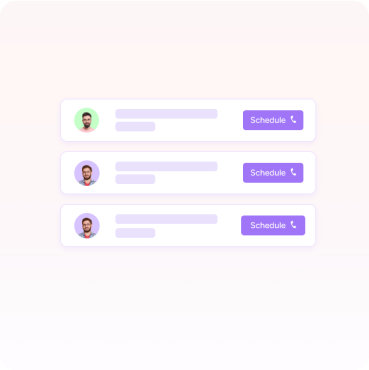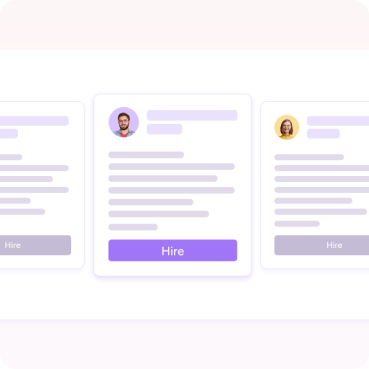Regular hiring
High RiskHire Backend developer of Silicon Valley caliber
Hire pre-vetted full time remote Backend developer from India. Hire now and build your dream engineering team with Hyno
Join 4,000+ companies already growing








Our Top Remote Developers
Hyno conducts rigorous testing and carefully vets the developers who are fueled by passion and skill sets. Hence, our developer community is the foundation for innovation and collaboration, bringing ideas and projects to fruition.
OUR STANDARDS
Hyno vs. Your regular recruitment process.
Find a risk-free, pre-interviewed, high-quality developer who is remote-ready in less than 2 weeks at 40% less cost.
Parameters
Choose the right for your firm.Time
Fees
Quality
Pre Screening
Remote readiness check
Termination
Failure rate
1 - 4 Months
> $1000
High
Low
Freelancing
High Risk1 - 2 Months
No fee
No
Very high
 Low Risk
Low Risk
0 - 15 Days
No fee
No
Very low
Pricing Starts from $35/hr
Accomplishing everything in just 3 steps
Our technical manager aligns the required skillset and tech stack with our talent pool to help you find the best fit.

Shortlisting candidates
Precise Hiring: Understanding, Gathering, and Shortlisting nittygritty.
-
 We start by thoroughly understanding your unique needs and specifications.
We start by thoroughly understanding your unique needs and specifications.
-
 check markWe
align the developer details with company goals. This way, we tailor the candidate
selection to seamlessly integrate with the organization’s vision and goals.
check markWe
align the developer details with company goals. This way, we tailor the candidate
selection to seamlessly integrate with the organization’s vision and goals.


Scheduling an Interview
Effortless talent selection: Finding your perfect match
-
 We connect you with the chosen candidates to ensure a personalized experience.
We connect you with the chosen candidates to ensure a personalized experience.
-
 Our rigorous
selection process guarantees that you find candidates who align seamlessly with your
requirements.
Our rigorous
selection process guarantees that you find candidates who align seamlessly with your
requirements.


Onboarding the talent
Streamlined onboarding for peak performance.
-
 The selected/qualified talent integrates smoothly through structured onboarding to
quickly adapt to projects, processes, and team dynamics.
The selected/qualified talent integrates smoothly through structured onboarding to
quickly adapt to projects, processes, and team dynamics.
-
 We go beyond
integration to offer ongoing support for a seamless transition to ensure that the
new talent exceeds your expectations.
We go beyond
integration to offer ongoing support for a seamless transition to ensure that the
new talent exceeds your expectations.


Read hiring guide
A one-stop shop to hiring the right Backend developer
How to hire a Backend developer? Skills to look for, interview questions, and more
Hiring a dedicated developer for your business can
be a cumbersome task. As many companies are competing to hire top Backend developer,
so finding a good developer is not as easy as it may seem.
We're here to assist all employers who choose to hire Backend developer on their
own. Recruiting a developer on your own requires a fair amount of software
development experience in general. However, if you're a non-technical manager
interested in learning more about how to hire a Backend developer, we've put up
an excellent resource for you.
What are the things to check on the critical skills required to hire a remote backend developer?
The following are the essential skills that a backend developer should possess to become proficient in Backend Development:
1. Programming language proficiency: Depending on the company's tech stack, backend developers should have a clear understanding of Java, Ruby, Python, or other similar programming languages.
2. Understanding of databases: Backend developers must be skillful with databases like MySQL, PostgreSQL, or MongoDB and capable of optimizing queries effectively.
3. Understanding of APIs and web services: Backend developers should have a strong understanding of RESTful APIs, GraphQL, and web services.
4. Familiarity with version control: Experience with version control systems like Git is essential for any backend developer.
5. Understanding cloud technologies: Familiarity with cloud technologies such as AWS, Azure, or Google Cloud Platform is essential, depending on the company's infrastructure.
6. Knowledge of server-side frameworks: Familiarity with frameworks such as Flask, Django, or Express is valuable for developers to build robust backend applications.
7. Familiarity with testing frameworks: Understanding testing frameworks like Mocha or Jest helps backend developers write efficient, reliable, and scalable code.
8. Familiarity with software architecture patterns: Backend developers should understand architecture patterns like MVC, Microservices, or SOA to design scalable and maintainable applications.
9. Familiarity with performance optimization techniques: Knowledge of techniques like caching, load balancing, and horizontal scaling helps backend developers design high-performing applications.
10. Good problem-solving skills: Every backend developer should have strong problem-solving skills and a mindset to troubleshoot issues that arise during development.
Ideal Hiring Process for Backend Developer
1. Defining the job description: Clearly define the remote backend developer's role, responsibilities, and required skills. Be specific about the programming languages, frameworks, and tools you seek.
2. Source candidates: Use online job boards, social media, and professional networks to source potential candidates. You can also consider working with recruitment agencies or tapping into developer communities
3. Screen resumes: Filter resumes according to the job requirements and shortlist the best fit.
4. Conduct initial interviews: Conduct video or phone interviews to assess the candidates' technical skills, experience, and cultural fit. Use coding challenges or technical assessments to evaluate their coding ability.
5. Schedule follow-up interviews: Schedule follow-up interviews with the most promising candidates to dive deeper into their technical skills. Discuss their experiences and ask questions about their work style and communication skills.
6. Check references: Examine candidates' references to verify their experience and performance.
7. Extend an offer: After identifying the best candidate, extend a formal job offer that includes compensation, benefits, and other relevant details.
8. Onboard the new hire: Once the candidate accepts the job offer, onboard them to the company's tools, processes, and culture. Provide them with the necessary resources, such as a company handbook, communication, and development tools, to ensure they can start working effectively immediately.
Important Interview questions to ask to Hire a Azure developer
What programming languages are you proficient in?
The ideal candidate should be proficient in one or more programming languages, depending on your company's tech stack. Look for candidates with experience working with Java, Python, Ruby, or Node.js.
What databases have you worked with, and what is your experience with database design?
Backend developers should be proficient in working with databases such as MySQL, PostgreSQL, or MongoDB and understand how to optimize database queries. Look for candidates who have experience designing and optimizing databases for performance and scalability.
What is your experience with RESTful APIs, GraphQL, and web services?
Backend developers should have a solid understanding of APIs and web services. Look for candidates with experience designing, building, and integrating APIs and web services into backend applications.
What version control systems have you used in the past?
Experience with version control systems like Git is essential for any backend developer. Look for candidates with experience using Git to manage code changes, merge code branches, and collaborate with other developers.
What cloud technologies have you worked with?
Familiarity with cloud technologies such as AWS, Azure, or Google Cloud Platform can be necessary, depending on the company's infrastructure. Look for candidates with experience deploying, managing, and scaling applications on cloud platforms.
What server-side frameworks have you worked with, and what is your experience with server-side development?
Familiarity with server-side frameworks such as Flask, Django, or Express can be valuable for developers to build robust backend applications. Look for candidates with experience developing scalable and maintainable applications using server-side frameworks.
What testing frameworks have you used in the past?
Experience with testing frameworks such as Mocha or Jest can help backend developers write efficient, reliable, and scalable code. Look for candidates who have experience writing and executing tests for backend applications.
What software architecture patterns are you familiar with, and how have you implemented them in your previous projects?
Understanding software architecture patterns like MVC, Microservices, or SOA can help backend developers design scalable and maintainable applications. Look for candidates with experience implementing software architecture patterns in their previous projects.
What performance optimization techniques have you used to improve application performance?
Knowledge of performance optimization techniques such as caching, load balancing, and horizontal scaling can help backend developers design scalable and high-performing applications. Look for candidates who have experience optimizing backend applications for performance and scalability.
How do you approach problem-solving and troubleshooting issues in your code?
Backend developers should have strong problem-solving skills to troubleshoot and fix issues that may arise during development. Look for candidates who can explain their approach to problem-solving and provide examples of how they've successfully resolved issues in their previous projects.
Job Description Template for Backend developer
Location: [Insert Location]
Job Title: Backend Developer
Position Type: Full-Time
Salary: [Insert Salary Range]
We are looking to hire an experienced Backend Developer to join our team remotely. You will be responsible for designing, developing, and maintaining the backend systems that power our web applications. You will work closely with our front-end developers, product managers, and designers to deliver high-quality software solutions.
Key Responsibilities:
- Design and development of scalable, reliable, and secure backend systems that power our web applications.
- Clean, efficient, and maintainable coding using programming languages such as Java, Python, Ruby, or Node.js.
- Build and integrate APIs and web services to enable seamless front-end and back-end communication.
- Database query optimization, schema design, and indexing to enhance application performance.
- Collaborate with cross-functional teams to define requirements, prioritize features, and deliver high-quality software solutions.
- Identify and troubleshoot issues with the backend systems and work proactively to resolve them.
- Stay up-to-date with emerging trends and technologies in backend development. Propose new ideas and solutions to improve our products.
Requirements:
- Bachelor's or Master's degree in Computer Science or a related field.
- At least 3-5 years of experience in backend development, preferably in a startup or a fast-paced environment.
- Proficiency in one or more programming languages such as Java, Python, Ruby, or Node.js.
- Experience with databases such as MySQL, PostgreSQL, or MongoDB.
- Knowledge of database design principles and optimization techniques.
- Strong understanding of RESTful APIs, GraphQL, and web services.
- Experience with server-side frameworks such as Flask, Django, or Express.
- Familiarity with version control systems such as Git.
- Strong problem-solving skills and ability to troubleshoot and debug complex issues.
- Excellent communication skills and ability to work collaboratively in a team environment.
We would love to hear from you if you are an experienced Remote Backend Developer who enjoys working in a fast-paced, challenging environment. Please submit your resume and cover letter for consideration.